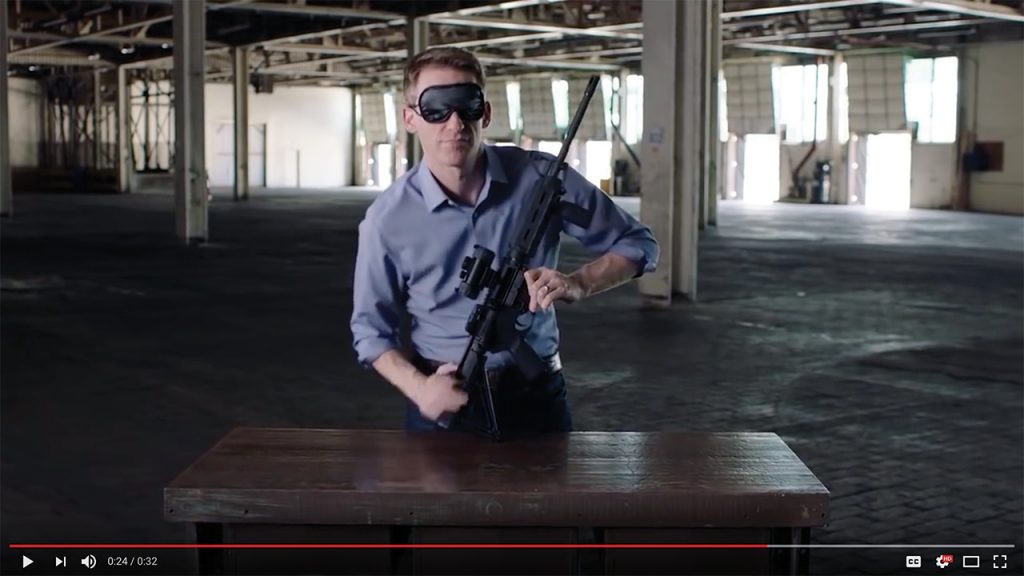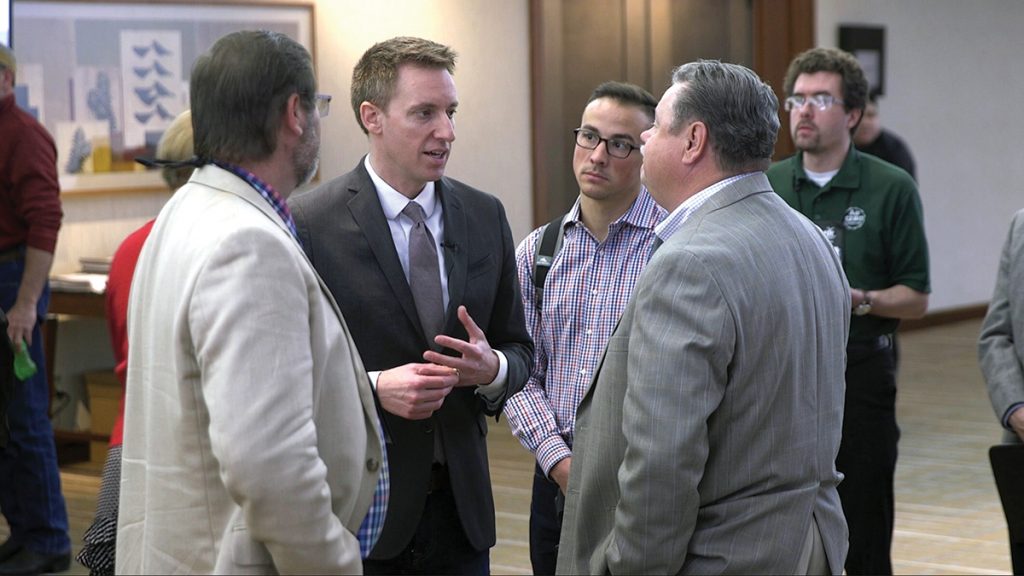
Just when the buzz was building to a crescendo that 37-year-old Kansas Citian Jason Kander might run for the Democratic presidential nomination in 2020, Kander rocked the local political establishment by announcing instead that he was jumping into the already crowded race to succeed Sly James as mayor in 2019.
Kander was born in Overland Park and raised in Shawnee with one biological brother and other children his parents fostered that he considers brothers as well. He graduated from Bishop Miege High School in 1999, then earned a bachelor’s in political science at American University in Washington, D.C. Following the 9/11 attacks in 2001, Kander enlisted with the Army National Guard. He earned his commission through the ROTC at Georgetown University, where he completed his law degree in 2005. He volunteered for a tour in Afghanistan, serving as an intelligence officer.
When he returned to Missouri, Kander taught combat leadership skills at Fort Leonard Wood, as well as teaching political science at the University of Missouri-Kansas City and practicing law. He was honorably discharged in 2011.
In 2008, Kander was elected to the Missouri House of Representatives, where he served two terms before being elected Secretary of State of Missouri in 2012 at age 32.

In September 2016, Kander catapulted to national fame when, running against Roy Blunt for U.S. Senate, he dropped an ad that showed him assembling an AR-15 rifle blindfolded that quickly went viral. After narrowly losing, Kander founded Let America Vote, a political advocacy organization that is fighting voter suppression and has landed a contract as a political contributor to CNN. (He did not renew that contract when it ended in 2018 but still appears on CNN and other networks).
Kander has gained a national fan base through constant Tweeting on his travels around the country for Let America Vote. He also has written a memoir called Outside the Wire: 10 Lessons I’ve Learned in Everyday Courage.
Kander and his wife, Diana, have a four-year-old son, True.
Over the course of two in-depth chats with In Kansas City, Kander deflects questions about whether he has long-term national ambitions, though his steady eye contact and wide crooked smile do not refute the premise. He reflects on his life’s work and dreams with long, thoughtful answers that wind like the oxbow of a river, always flowing back to the main channel.
On his vision for the city:
I want to make sure that no matter where you live in the city and however you grew up, you have a chance to build your life right here. We will know that Kansas City is at its best when we don’t have to move people—whether it’s because of a job, education, crime, housing, or infrastructure—from one part of the city to another or out of town altogether to live the life that they want and deserve.
On why he believes he is the best qualified candidate to lead the city:
I got my start in public service working for Kansas City in the state legislature—on the budget committee I made sure we got our fair share of state resources. I worked on issues like local control of the police department and a whole host of others, like keeping state jobs here when folks were trying to move them to mid-Missouri, support for the zoo, funding for UMKC and the arts, working with both sides of the aisle to try to get a truce on the border war, just a lot of different things.
But I’ve also held an executive position as the Secretary of State of Missouri, and it’s a job I would not have had if voters in Kansas City hadn’t supported me. I got more votes, for instance, in 2016 in Kansas City than anybody else on the ballot, so people here know that I’ve always worked hard for them.
And on top of all of that, I’m a former army officer who served in Afghanistan, so I’ve got pretty substantial leadership experience. Sorry, it’s a super-long answer—I’m excited to do the job and I think I’m ready to do it from Day One.
On what the top priorities of a Kander administration would be:
Well, when you look at some of the major issues that have gotten off the ground in the past few years, that’s what’s going to confront the next mayor to start with: building the new airport, implementing the infrastructure improvements that voters approved, and expanding the streetcar.
And I want to make sure we still give attention to critical issues like addressing economic inequality, decreasing crime, having an inclusive housing and economic development plan and guaranteeing every child in the city has access to a quality education.
But then there’s other stuff that people don’t talk about as much that I think is extremely important, like making sure that people have enough access to grocery stores, banks and other basic services, and doing more for racial and gender equity in city contracts and programs, and always looking to improve city services.
On his strengths as a politician:
You know there’s this rare compliment that is unique to politics that people give: “You seem comfortable in your own skin,” and I’ve always found that hilarious. Nobody ever says, “I like my accountant because he’s just a regular person.” So I guess if I have a strength it’s that (laughs) I’m normal, or at least that I seem normal.

On personality traits he inherited from his parents:
My folks taught me to understand that I come from a place of a certain level of privilege. You know the old expression: born on third believing you hit a triple? I don’t know if I was born on third or somewhere between second and third, but I know that whatever it was, I didn’t get the hit that got me there. They taught me that if you’ve had success, that doesn’t mean you pull up the ladder behind you. It means you go looking for other ladders.
My parents met as juvenile probation officers. My dad was working as a cop at night and then for most of my childhood he ran a security company.
And that was the other thing, I saw them work very hard. I don’t recall a lot of times where my parents would say something to me like, you’re the best on your baseball team or the best at whatever I did academically. What I do remember them saying is that they were proud of me because they could see how hard I was working.
My dad used baseball to teach me what kind of man he wanted me to be. I can remember going to Royals games, and George Brett would hit a one-hopper back to the pitcher, and Dad would say “Jase, watch what he does.” And Brett would run as hard as he could to first base knowing he was out. And Dad would say, “Look at George Brett—even when he knows he’s out, he respects the game so much that he hustles.” Really dad taught me about hustle, that was the thing.
On that thing he does that annoys his spouse:
My wife always asks me, “Do you not want to do…” (freezes, then looks as assistant Zach Bowman) Oh, gosh, I just realized I didn’t take out the trash this morning. (Zach admits he noticed the neighbors’ trash was out and should have said something when he picked Kander up.)
No, it’s my fault. Today’s trash day, and I meant to, oh, oops (winces). Well, so that’s a good example, ‘cause Diana will say things like, “Do you not see that the trash is full or… (laughs).”
We’ve been together since we were 17. Diana always says that whatever annoys you about your spouse is directly connected to what you love about them. So she will always say that she loves that I worry about big, big problems in the world, and she thinks that that’s directly connected to the fact that I won’t necessarily see that the trash needs to go out.
On traits he would like to emulate in his wife:
My wife came to the United States at the age of 8 with her family. They were refugees from the Soviet Union—refugees of anti-Semitism in Ukraine. And so Diana, in addition to all her other gifts—she’s brilliant and she’s funny and she’s beautiful—but she also has just sort of this vibrance and it’s beyond optimism, because it’s not blind optimism, it’s by choice. So when people ask her just as sort of a passing hello, “How are you doing?” she almost always will say, “Fantastic!” And it throws people off, but what they don’t realize is, she stops, thinks about it, and decides, “Yeah, my life is great, I’m very fortunate.”
She doesn’t phone anything in, like right now she’s creating a little home office for us upstairs in what was our guest bedroom. And she’ll find a way to do it that costs us very little money, and it will be just outstanding. At the same time, she just finished her second book, and she’s an awesome speaker and an innovation consultant. And, oh, as a way to save money for the past 15 years, she’s been my barber. She cuts my hair and she cuts my son’s hair. She plays a huge role in making my podcast successful.
On his geeky side:
I follow the Kansas City Royals at a level that most people find obnoxious. At one point, Diana instituted a rule in our home that no more than 25 percent of our conversation could be about the Royals’ farm system. I’ve been all about it for my entire adult life and they’ve only had four winning seasons in my adult life—two of them they went to the World Series, and one of them they won, and those were amazing. And I was at the 2014 wild-card game with my dad. Yeah, I took my dad to that game and that’s one of the top five days of my life.
But for me, following this team—and look, I know you’re going to see a lot of losses—but part of what’s exciting about it to me is watching the players, watching them develop and seeing what happens next. I guess I see it like, if your kid were on a Pop Warner team and they lost every game you wouldn’t be like, I’m not going to the games.
On what perfect down time looks like:
The way most people feel sitting on a beach, that is how I feel sitting in the stands at Kauffman Stadium. It’s a level of stress-free relaxation and Zen that other people get at a beach.
“To me, everything I do is just a continuum of trying to make the world a better place, which sounds very hokey, but it’s the way I was raised.”
On why he founded Let America Vote:
To me, everything I do is just a continuum of trying to make the world a better place, which sounds very hokey, but it’s the way I was raised. I volunteered to serve in the Army and I volunteered to go to Afghanistan because there are rights and freedoms that I want to protect, and I’ll be damned if I’m going to come home and watch people like Kris Kobach or Donald Trump try to take those rights away. So that’s why I started Let America Vote.
On the recent history of voting rights in America:
When we got close to 2000, we weren’t at a place where every eligible American voter was getting to the polls, but we were on a trajectory to get there. And then what happened was, after 2000 and the debacle in Florida, Congress first passed the Help America Vote Act. And honestly, the Republican Party at that point, at least the elected established Republican Party, decided that they actually weren’t that interested in helping America vote, because they looked at it and felt, when more people voted they were less likely to win elections.
So they pretended to crack down on fraud, but the truth is, you’re statistically more likely as an American to be struck by lightning than you are to commit voter impersonation fraud. What they cracked down on was voting. And they crafted a bunch of policies—everything from photo ID to voter purges to scaling back voting opportunities, and there’s a lot more examples—that target people of color, working people, young people, women, disabled people.
For instance, in Missouri when I was Secretary of State the legislature wanted to pass an extreme photo identification requirement for voting, and the only kind of fraud that a photo ID law can even pretend to prevent is voter impersonation fraud—somebody showing up and pretending to be somebody they are not. There has literally never been a reported case of voter impersonation fraud in the history of the state of Missouri. Now that said, there are over 200,000 Missourians who are legal, eligible, registered voters who don’t have a driver’s license. Oh, and by the way, that is a population that is disproportionately people of color or disabled or women or young people or low-income folks. The problem that [Republicans] are solving is that these populations that they are targeting have a bad habit of not voting Republican, and so when they don’t vote, from the Republican Party’s perspective: problem solved.
And an important caveat here is I’m not talking about the Republicans that are going to read this magazine. I’m talking about Republican elected officials. Because the average Republican voter, when they look at what these laws actually do… says, “I don’t think we should limit who votes at all; I think we should just convince people to vote for us.”
On whether his group is active in Kansas, which ranks high among states for voter suppression:
Kansas is not one of the five states where we have people on the ground right now [Ed. Note: those are Georgia, New Hampshire, Tennessee, Iowa, and Nevada], because we focus on states where there have been recent instances of voter suppression. But it doesn’t mean that we won’t be there at some point.
Look, Kris Kobach is the chief vote suppressor in the United States, and now he’s running for governor of Kansas. I don’t understand somebody that wanted to be the Secretary of State for their state in order to make it harder for eligible voters to vote. That’s un-American to be honest, and I find it offensive. But it’s also just weird.
“What is it that politicians, including people like me, are doing that has caused them to reach the conclusion that voting is not worth their time? And what can we do better to inspire them to be a part of the process?”
On people who choose not to vote:
I want everybody to vote, but I’m always really careful when I hear a lot of politicians who say, “Why aren’t these people voting?” The thing is, that’s putting it on the voter. When people don’t vote—provided they are not prevented from doing so—that’s kind of a vote. That’s people saying, “You have not proven to me that this is worth my time.”
If someone chooses not to vote, it is not productive for me to get mad at them. It is much more productive for me to say, “What is it that politicians, including people like me, are doing that has caused them to reach the conclusion that voting is not worth their time? And what can we do better to inspire them to be a part of the process?”
On how voting ought to work:
There’s no reason not to have automatic voter registration—they already have it in Oregon and California. By the time you are 18, you are already in the system in most cases, from a driver’s license or Social Security card or Selective Service registration.
What it all comes down to with all of these policies—whether it’s about automatic voter registration or vote at home, which is like vote by mail, or same-day registration, whatever it is—there are a lot of examples of ways we can treat voters like customers of the process as opposed to like criminal suspects. m
Interview condensed and minimally edited for clarity.

